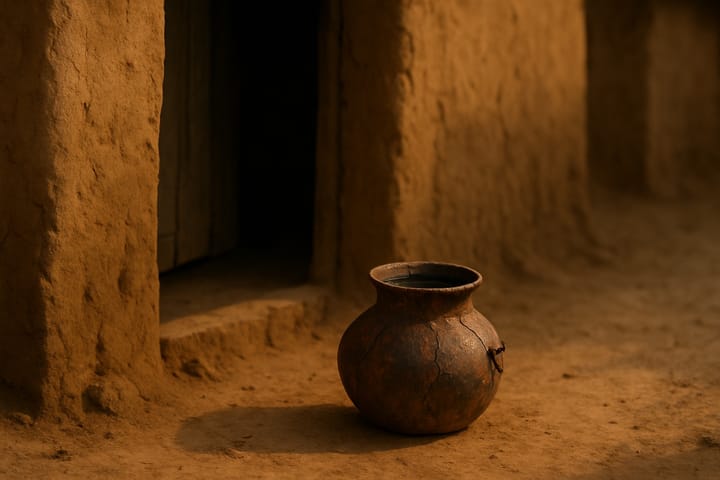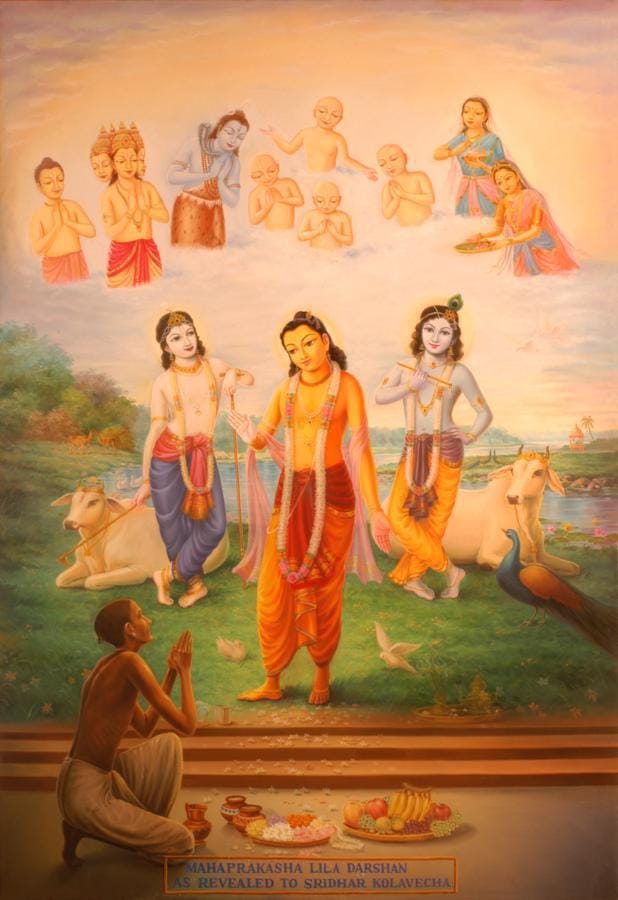Mahāprabhu's Love for the Unseen Devotee (Part One)

To most of the inhabitants of Navadvīpa at that time, Kholā-vecā Śrīdhara was no one special or noteworthy—just another poor, forgettable banana-leaf vendor (kholā-vecā). He didn't even own his own banana trees; he would buy different parts of the trees—the stem, flowers, bananas, and leaves—and resell them. There definitely was no shortage of banana trees in tropical Bengal, so you can imagine how meager his earnings were.
Yet Mahāprabhu would make His way out to visit Śrīdhara, who lived about 3.5 kilometers from His home, and playfully haggle with him over his banana products.
Below is a loose translation of Śrī Caitanya-bhāgavata (Ādi-khaṇḍa 178–213), illustrating this sweet pastime:
❝The Lord was exceedingly pleased with Śrīdhara and He would often find excuses to visit his simple home. Engaging in witty exchanges and playful arguments with Śrīdhara, the Lord would spend two to four daṇḍas (48-96 minutes) in great joy before moving on.
Seeing the Lord, Śrīdhara offered his obeisances and respectfully provided Him a seat. Śrīdhara was supremely peaceful and composed, yet the Lord would delight in playfully sporting with him, acting as if most impudent and aggressive.
The Lord said, "Śrīdhara, you constantly chant 'Hari! Hari!' So why do you still experience such suffering and hardship? You serve Lakṣmī-kānta, the husband of the Goddess of Fortune, yet why do you suffer for lack of food and clothing? Tell me, I want to hear what you have to say."
Śrīdhara replied, "I do not go starving. And whether my garments are large or small and tattered, I'm at least able to wear something"
The Lord said, "But I've noticed how your cloth is tied in ten places, and tell me, where is the straw on your hut on your hole-filled roof? I see none! Just see how the other townspeople who worship Caṇḍī and Viṣahari do not have any scarcity of sumptuous meals or clothes at home."
Śrīdhara humbly responded, "O respected brāhmaṇa, Your words are true, yet still, time moves equally for all. The king has jewels in his palace and eats luxurious meals, while birds dwell above in the trees, but in the end, time is equal for all, and each person experiences the results of their own actions, according to the will of Bhagavān.”
The Lord said, "You actually have great wealth, which you are secretly hoarding and enjoying. One day, I will expose everything. Let's see then how you explain yourself and cheat the people."
Śrīdhara sighed, "O Paṇḍita, please go home. It is not proper for us to quarrel like this."
But Mahāprabhu would not relent. "I am not leaving just like that. Tell Me now—what will you give Me?"
Śrīdhara replied, "I sell banana leaves for a living! Tell me, what can I possibly give You, Gosāi?"
The Lord said, "Keep your hidden treasure where it is for now—I will take that later. For now, just give Me bananas, banana flowers, and banana stalks free of charge. If you do that, I won't argue with you anymore."
Śrīdhara thought, "This brāhmaṇa is so stubborn and aggressive! What if one day He actually beats me? Even if He does, what can I do? But I cannot continue supplying Him daily like this free of charge. Nevertheless, whatever this brāhmaṇa takes by force or trick, it is my fortune because a brāhmaṇa is the representative of the Supreme Lord. So I'll be prepared to give him every day."
Resolving this in his heart, Śrīdhara said, "Listen, Gosāi, I ask nothing from You. Take all the banana stems, bananas, banana flowers, and banana leaves You like—just don't argue with me anymore.
The Lord beamed. "Excellent, excellent! No more quarrels! But make sure I get the very best bananas and banana stalks."
In this way, the Lord would daily eat off Śrīdhara's banana leaf plates, and His meals included the banana stems, bananas, and banana flowers Śrīdhara provided. Whenever a lāu (gourd) grew on Śrīdhara's vine, the Lord would eat it, cooked with milk and black pepper.
The Lord asked, "Śrīdhara, what do you think of Me? Tell Me, and I will go home."
Śrīdhara replied, "You are a brāhmaṇa, a portion of Lord Viṣṇu."
The Lord said, "You do not understand. I am from a cowherd family. You see Me as a brāhmaṇa's son, but I consider Myself a simple cowherd boy."
Hearing this, Śrīdhara laughed at the Lord's words, not recognizing the cherished Lord of his heart due to the influence of Yogamāyā.
The Lord then said, "Śrīdhara, let Me tell you the truth. All the glories of Your Gaṅgā originate from Me."
Śrīdhara replied, "Nimāi Paṇḍita! Have you no fear speaking like this about Mother Gaṅgā, the destroyer of sins?! As people grow older, they usually become more calm and composed, but Your restlessness only seems to double!"
In this way, Gaurāṅga Śrī Hari delighted in playful exchanges with Śrīdhara before returning to His own home.❞
The Hidden Vaiṣṇava
Through countless pastimes like this, Mahāprabhu showed that He cares nothing for one's high status and accomplishments. The devotees He sought out, for whom He'd sometimes travel very far to see, and with whom He engaged in the most intimate, carefree, sweet pastimes were often those whom the world overlooked—the hidden Vaiṣṇavas.
Śrī Caitanya-bhāgavata (Madhya 9.145) states: 'kholā-vecā' jñāna kari' keho nā cinaya—No one recognized Śrīdhara Paṇḍita, as they considered him merely an ordinary banana leaf seller.
It makes me wonder how many simple "nobodies" I've walked past, never giving a second thought—yet they might be the ones cultivating the deepest relationships with Guru and Gaurāṅga. And I'd never know, because outwardly, there's nothing flashy about them.
The Quiet Devotee
In a small Chinese village, I remember seeing an old grandma. She was as simple as they come—not particularly educated in our philosophy, too frail to move much, barely speaking with anyone. She hadn't had the years of association with devotees that many of us have been blessed with. But all she knew was the mahā-mantra, and pretty much all she did from morning till night was quietly chant in her sweetly mispronounced Chinese accent, "Hale Klisna, Hale Klisna..." And because she hardly spoke or saw much, I have a strong feeling she never criticized any Vaiṣṇavas.
Remembering this is making me reflect: One may have produced many books, spent years in the maṭha or in the dhāma, attended countless parikramās and festivals, served many Vaiṣṇavas, rolled countless chapattis, peeled thousands of potatoes. Yet what does it all amount to if the motivation was mostly to impress others? Or worse, if offenses were made to dear devotees along the way? Of what real value is one's chanting of harināma if it is rushed through mindlessly, just to complete the daily count and move on to the thing one actually wants to do?
All the while, that simple old Chinese grandma, whom no one knows about, is miles away from the dhāma or any temple, yet possibly miles ahead in bhakti. Who knows how far along she is with her simple heart and sincere faith chanting, chanting, chanting...
In her simplicity and innocence, who knows how Kṛṣṇa is reciprocating with that sincere, offenseless calling out to Him? What amazing situation might He be arranging for her in her next birth?
A drop of selfless, heartfelt service outweighs mountains of selfishly motivated service. Kṛṣṇa looks not at the grandeur of our actions but at the simplicity and sincerity behind them.
To conclude, I'll share a passage from my Paramgurudeva, where he recounts how Śrīla Bhaktisiddhānta Sarasvatī Gosvāmī Prabhupāda revealed that sincere, humble service from the heart often carries far greater significance than what appears to be grand, impressive contributions to the world:
"What qualities endear one to Śrīla Prabhupāda?"
❝Jagad-guru Śrīla Prabhupāda had a sannyāsī disciple (Bhakti-vilāsa), who is no longer present. We never observed him displaying any worldly skill in his life. Some of his peers, high-status sannyāsī teachers and speakers, cast aspersions on his [apparent] inactivity a couple of times. Śrīla Prabhupāda, roaring like a lion, strongly corrected them.
“I am a big orator. I am a very good instructor. I can captivate everyone with my classes and speeches. I have so much capability. So many people are coming to the maṭha due to my lectures. I am therefore a prominent and dear disciple.” Śrīla Prabhupāda never considered those with such a mentality to be exalted servants. The aptitude for bhakti is something else. It is only attained by extreme good fortune.
In observing the life and conduct of Śrīla Prabhupāda, we saw several seemingly contradictory incidents.
We saw that someone conversant in all the scriptures, adored by scholars and the veritable sun of philosophical truths had accepted a completely illiterate personality as his guru.
We worship Prabhupāda as the personification of the divine message (vāṇī), and yet when one of the main assistants in his vāṇī-vilāsa-līlā (preaching pastimes), a particularly bright writer, was overwhelmed by a weakness of heart and suddenly left the maṭha to go to Dhaka, Prabhupāda was not in the least perturbed. On the other hand, he would become extremely anxious if one of his servants, whose name was Pañcānana and who happened to be illiterate, went out of his sight for even a moment. This seems quite startling and perplexing, but in reality, it is not, even slightly. These interactions reveal the full current of the nature of bhakti. Unlimitedly greater than service to Prabhupāda by moving a pen, which brought about a revolution in the world, is the service propensity of an illiterate person’s heart-felt affection for him. The root fibre of the aptitude for bhakti is attachment to the lotus feet of śrī guru.❞
(Read the full article here.)
This fills me with hope because this pure and sincere tendency to serve Kṛṣṇa is the intrinsic nature of us tiny jīvas—it is what we are made to do. It's not something far away or foreign to us. Nothing could be more natural for us, and we have all the help from our guru-varga one could ever hope for to reestablish ourselves in that eternal function.
In the next post, we will take a look at my all-time favorite section of Śrī Caitanya-bhāgavata, which offers an even more detailed portrayal of Kholā-vecā Śrīdhara’s simplicity and love, as well as Mahāprabhu’s abundant affection for him.



Comments ()